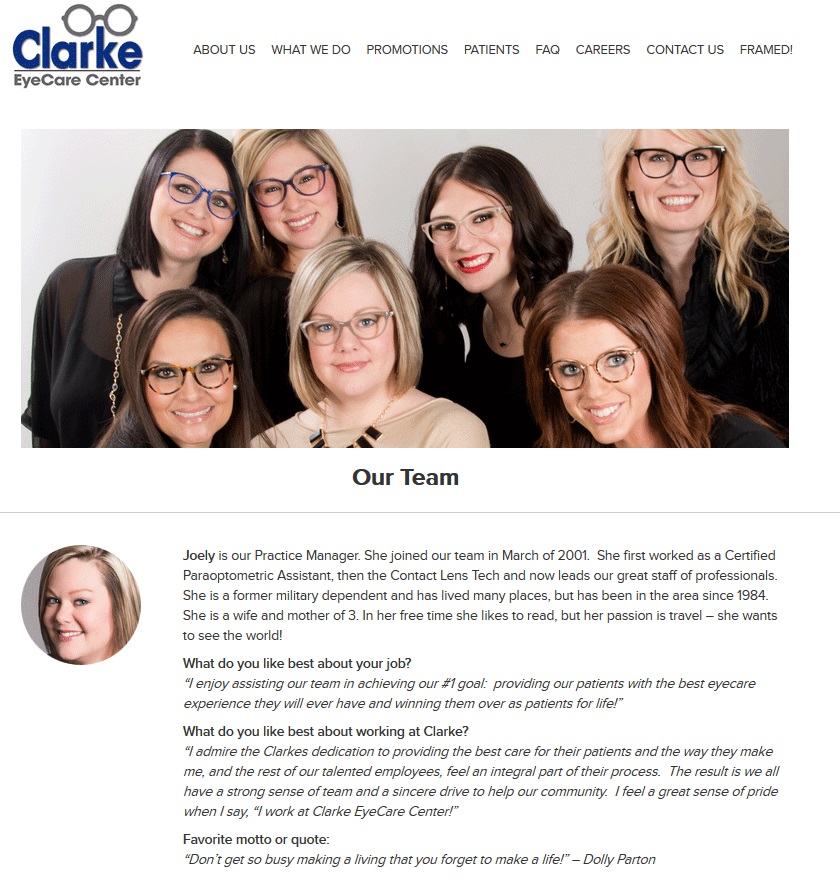By Danny Clarke, OD

June 28, 2017
Having a positive practice culture is important to employee performance and employee ability to serve patients, helping you grow your practice and revenues.
Here are the key elements that have enabled Clarke EyeCare Center, my four-OD, 22-team member practice in Wichita Falls, Texas, to have the kind of practice culture that makes employees want to serve patients as well as they can, and to help us grow our business.
The emphasis we place on creating a positive culture has been noted beyond our staff. In February, our practice was ranked on Entrepreneur’s Top Company Cultures List, a comprehensive ranking of U.S.-based businesses exhibiting high-performance cultures created in partnership with culture management software and service provider CultureIQ. Clarke EyeCare Center was ranked 25th in the Small Company category.
Culture is a word that is hard to define, but to me it’s the pulse of an organization. When I think of a great culture, I think of an organization where the entire team works well together. Everyone is on the same page, and works to help each other perform better while delivering outstanding service and/or products to their customers.

Each of Dr. Clarke’s support staff members share what they most like about their jobs on the practice web site. Part of the practice’s culture is enthusiasm for serving patients, which Dr. Clarke says aids the practice’s success.
Hire the Right People
Creating a practice culture, which you feel will most benefit patients and profitability, hinges on hiring people who possess the qualities that you have identified as important to your culture. For example, if you want a friendly, open office, in which patients feel secure they will receive focused attention and care, hire people who demonstrate those qualities during the interview process.
You would want to hire people who are easy to chat with during the interview, who are expansive in their answers to your questions, rather than giving one-word, or one-sentence answers. You would want people who are eager to answer your questions by sharing their thoughts and ideas.
Click HERE to read more about our system for recruiting the best people to serve our patients and grow our business.
I think it’s most important to see if the applicant can engage in a conversation. I don’t like a question-and-answer session as much as to be able to have a good conversation. We want to make sure the applicant is someone who seems passionate about what they do, and are very personable. We ask the kind of questions that enable us to get to know the person, rather than just quizzing them. We focus on assessing their attitude and personality.
Click HERE to watch a video in which I share how we use personality assessments as part of our hiring process.
Share Your Vision & Goals
For an organization to have a great culture, leaders must share their vision for the company with their team. I think many businesses don’t have great cultures since they either don’t have a vision for their company, or have not relayed this vision to their team. Culture starts with leadership, but must include a team of the right people who are willing to share in this vision.
We play the Great Game of Business, where we share the financial progress of the practice without divulging doctor or employee income. Team members track practice financial metrics, which they are empowered to help improve. They present status updates on how those metrics are doing, and how we can do better, at weekly staff meetings.
Click HERE to watch two videos in which I share tips for implementing the Great Game of Business in your own practice.
In sharing what I feel are the key aspects of the practice to monitor, and work to improve, I’m sharing my vision of how we can be most successful for our patients and profitability.
An essential part of the Great Game of Business is it allows everyone on the team to think, act and feel more like owners of the business. Within the Great Game is a profit-based bonus system that gets everyone focused on the same goal, practice profitability.
We create monthly incentives called MiniGames to keep people focused on the task at hand. There are small team-based incentives when the goal is met, but the real benefit is that the team working together ends up fostering an improved culture.
Click HERE to watch a video about how one practice creates mini-games to incentivize staff.

Dr. Clarke says one of the ways he knows he has a successful practice culture is how far employees are willing to go to serve patients. When this child patient was in the hospital, and broke his glasses, the staff not only quickly made him a new pair, but also sent a stuffed animal wearing the same glasses.
Track Practice Culture Success
The way to determine whether you have a winning culture is to observe how well you and your team serve patients.
For example, last year we had a 4-year-old patient with cerebral palsy, who was in the hospital for surgery out of state.
He needed a new pair of glasses, and one of our team members went above and beyond for the patient. His mother posted this on Facebook:
“My son is in the hospital, where he will be for the next five weeks or so. He chewed up the lenses of his glasses, so I called Coty at Clarke EyeCare to order a new pair.
We received a package in the mail with a handwritten thank-you card, Chase’s glasses, and this puppy with a new pair of glasses on just like Chase wears.
This package could NOT have come at a better time! This is, by far, the best customer service I’ve ever received! Thank you SO much, for the fast turnaround and the thoughtfulness!! It means SO much to us!”
My practice manager and I found out about this after the patient’s mother posted it on Facebook. This is just one example of how our culture helps us better serve our patients.
We use such feedback from patients, whether in-office, from patient surveys, or online reviews, to help further build our culture. Positive reviews allow us a chance to brag on our people, and proves to all of us that the culture we have created is working to help us achieve our goal of delivering outstanding service to our patients. The rare times we receive negative feedback, we use it as a learning opportunity to not repeat our mistakes, and to do better.
 Danny Clarke, OD, owns Clarke EyeCare Center in Wichita Falls, Texas, which was just ranked on Entrepreneur Magazine’s Top Company Cultures list. They have also received an All-Star award by The Great Game of Business and were named the Family-Owned Business of the Year for the SBA Dallas/Ft. Worth district, which comprises 72 counties in Texas. Dr. Clarke is also the President of MODUS Practice in Motion, which offers open-book management training to optometric practices. To contact him: dbc@clarkeeye.com
Danny Clarke, OD, owns Clarke EyeCare Center in Wichita Falls, Texas, which was just ranked on Entrepreneur Magazine’s Top Company Cultures list. They have also received an All-Star award by The Great Game of Business and were named the Family-Owned Business of the Year for the SBA Dallas/Ft. Worth district, which comprises 72 counties in Texas. Dr. Clarke is also the President of MODUS Practice in Motion, which offers open-book management training to optometric practices. To contact him: dbc@clarkeeye.com



























